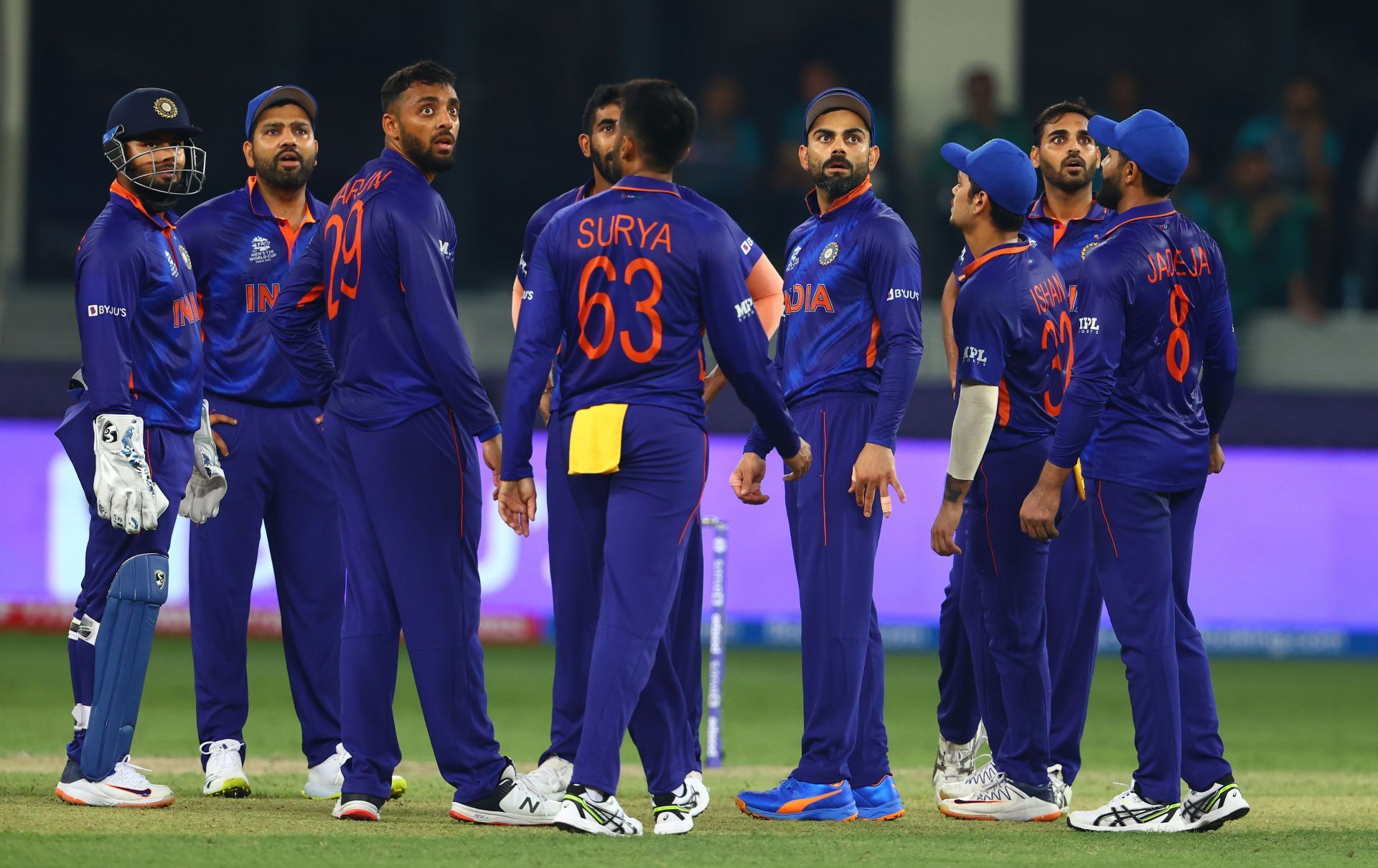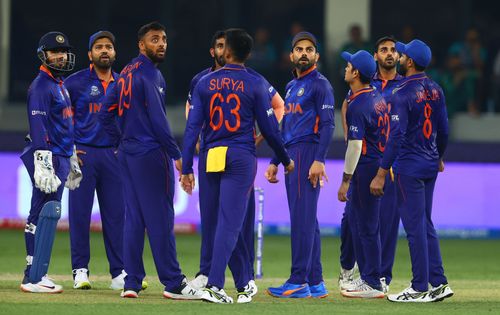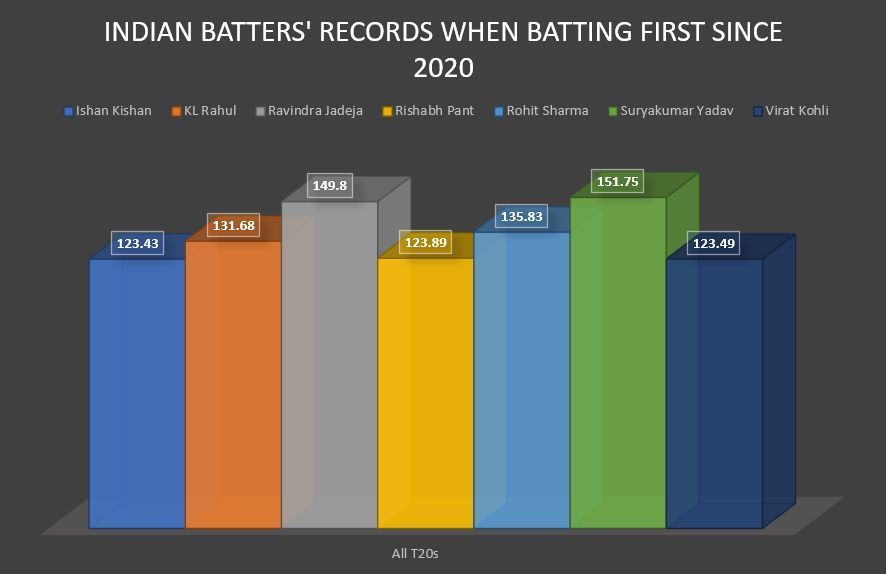
India in danger of becoming a one-trick pony

Picture this: India win the toss and elect to field against Pakistan. As soon as the coin-flip goes in India’s favour, Virat Kohli is quick to note the onset of dew as a major factor. He also feels bowling will allow the Men In Blue to ease into the tournament against their eternal rivals.
India’s pacers make the most of the conditions on offer. Though Pakistan race out of the blocks in the Power Play, the Men In Blue, courtesy of their dexterousness pull things back towards the end. Pakistan finish with a middling total – a total that seems paltry considering dew has now entered the fold.
KL Rahul sets out his stall early and looks to play the anchor role. Rohit Sharma, in his pursuit of increasing the tempo, perishes to Shadab Khan. Virat Kohli, though, arrests the slide, channels his inner chase master and guides India to a comfortable victory.
Indian fans are dancing in the aisles, the “Mauka Mauka” advertisements reverberate across the country and Kohli, rather unabashedly, says that people were wrong to question if IPL fatigue was going to mar their T20 World Cup campaign.
A week later, the coin goes up and Kohli, for a change, wins his second consecutive toss. He is swift in asking New Zealand to bat first – again, mirroring the reasons against Pakistan.
The same pattern continues. Martin Guptill gets a few boundaries away in the Power Play. India’s spinners hit back in the middle and Kane Williamson is left waging a lone battle. Unsurprisingly, the world begins singing effusive praises of India’s bowling attack and its ability to bounce back each time they bowl.
Rahul endured a rare off-day in the second innings. Rohit struggles for touch but because India are chasing a below-par total, Kohli anchors the innings and takes them across the line. The Indian skipper suddenly averages more than 100 in T20 World Cups and seems destined to break his ICC tournament hoodoo as captain.
India, by the way, are also atop Group 2 and England, who have had their struggles against spin, are looking nervously over their shoulders, for they might just have met their match.
Life is good, eh?
India's qualification hopes are in tatters
However, there is another perspective to this story – a perspective that has reared its ugly head twice already. And it could be the clearest indicator yet that India’s T20 World Cup campaign, which was supposed to be garlanded, is on the verge of unravelling. Spectacularly at that too.
So far, India haven’t bowled first in the T20 World Cup. They’ve lost both tosses and subsequently, both encounters. If it were any other team, it could be put down to sheer luck.
For India, though, the yardsticks, as they should, change drastically. Not just because all of their players have been playing in these very conditions over the past month but also because their outfit, pound-for-pound, is easily the best in the world.
To put things into context, India haven’t always enjoyed batting first, especially since the 2016 T20 World Cup. In fact, they’ve lost 17 out of the 41 times they’ve tried to defend a score. Of the 24 times they’ve won, two came in the Super Over. Nevertheless, it isn’t a record to be proud of.
Incidentally, India’s struggles batting first, which were highlighted when the West Indies blew them out of the water at Mumbai in 2016, have been exemplified since the start of 2020, despite Kohli saying that India wanted to embrace a more fearless approach.
They’ve batted first 14 times in this phase and have won 8 matches. Again, something that doesn’t seem too alarming but is enough to cause a concern when considering those eight victories include two Super Over triumphs.
The record of their personnel, though, is quite remarkable. Not just because of the reputations they carry but also because of the collective mediocrity that has accompanied them since the start of 2020.
Kohli – long considered the greatest T20I batter to grace the game, strikes at 123.49 when batting first in all T20 cricket in that period. Rishabh Pant, too, only strikes at 123.89 when these parameters are used.

KL Rahul, meanwhile, scores at a middling strike rate of 131.68 – a strike rate that drops to 124.13 when talking solely about T20Is. Ishan Kishan, who was drafted into the side to provide impetus, scores at 123.43 runs per 100 balls when batting first. In T20Is, that number spirals to 90.32.
The only anomalies in India’s top order are Ravindra Jadeja, Rohit and Suryakumar Yadav. Suryakumar, if reports and tweets are to be believed, was carrying an injury before the game against New Zealand.
Had he been involved, one feels his strike rate of 151.75 might’ve helped. The fact that he scores at a tick under 167 in T20Is wouldn’t have hampered India’s case either.
Rohit, on the other hand, wasn’t deemed good enough to open. Rohit, by the way, strikes at 135.83 (in all T20s) and 144.65 (in T20Is) when batting first since the start of 2020.
So it becomes pretty clear that India’s fortunes in the first innings were reliant on Rohit. But, for some reason, an ill-timed demotion meant that even he was pushed out of his comfort zone.
Remember, just a few months ago, Kohli had said that him and Rohit would open the batting in T20Is. None of them opened against New Zealand and there doesn’t seem to be a lot to suggest that that might change against Afghanistan as well.
Apart from how the personnel have fared, there also seems to be a fundamental problem with India’s philosophy. To an extent, it resembles how the Chennai Super Kings struggled in 2020 – an edition where they stacked their line-up with players who prioritized calculation over creativity.
At the time, it became painfully evident that the number of anchors is inversely proportional to the success a team enjoys. CSK’s 2021 IPL crown after a change in tack and India’s lackadaisical showing at the T20 World Cup has only driven that point home.
Rather astonishingly, Jadeja is the only Indian batter at this T20 World Cup to have registered a strike rate of more than 130 after having faced 10 or more balls in an innings.
The most telling aspect, though, could be about the leadership group and how much faith (read trust) they place in their players. At the post-match presentation, Kohli was quick to point out that India weren’t brave enough.
To a large extent, he is right. India were anything but the flamboyant selves they need to be. The constant chopping and changing, the incessant fear of “will I get dropped if I don’t perform in one game”, the batting order musical chairs and asking people to be something they are not (read Rishabh Pant) hasn't helped though.
See the latest T20 World Cup standings here.
As a T20 side, one must be adaptable and flexible, make no mistake about it. However, there also needs to be a stable foundation upon which these tweaks can be made. At the moment, the platform is discernibly crumbly, meaning that India have equated calculated gambles to firing arrows in the dark – all without knowing what the target is.
Speaking of targets, modern cricket has undergone a revolution where almost all teams bat well when they are chasing. Thus, if a team wants to win an ICC trophy, it is imperative that it can bat first. And win. India, so far, have provided no evidence of that ilk.
Again, raw statistics might indicate that India have only taken two wickets (both have fallen to Jasprit Bumrah) and that they need a rejig in their bowling attack. Some have even questioned if their bowlers are as good as they have been touted to be, for goodness’ sake. The bare fact, though, remains that the bowlers can’t do much if their more illustrious teammates put up such shoddy performances.
When bowling first, the pressure is on the bowlers to set up the game. According to numbers, they’ve done that fairly well too. The batters, however, have been ordinary, at best.
Moreover, for a captain like Kohli, who has developed a penchant for losing crucial tosses, it seems a little rich that India are depending on an event that only has a 50% probability of going in their favour anyway.
If history is to be believed, India will most definitely get their chance to chase against Afghanistan. Not because the law of averages say that Kohli is due (dew pun intended) to win a toss but also because Afghanistan like to bat first.
A victory, however, would only paper over the cracks that have been discernibly visible over the past couple of years.
Maybe, it means that India have become a one-trick pony, after all. T20 World Cups, though, aren’t won that way.